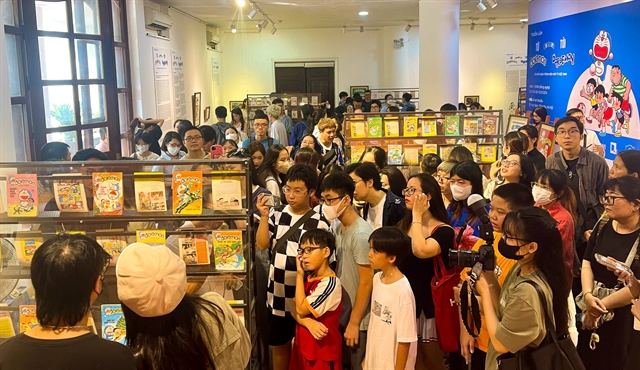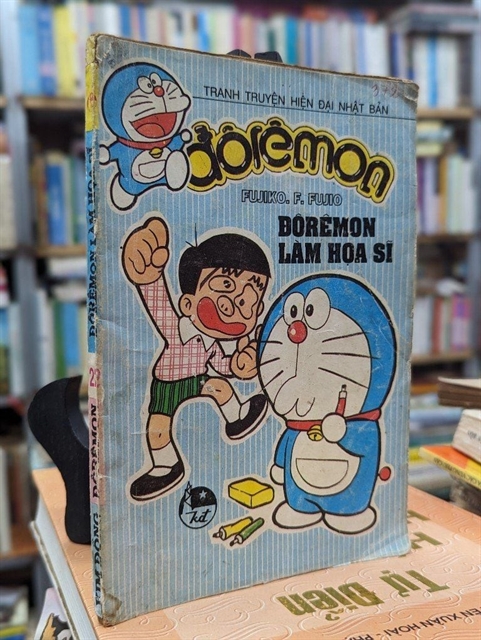 |
| Parents took their children in droves to the exhibition. — Photo courtesy of the organisation |
HÀ NỘI — A recently opened exhibit is giving Vietnamese people a good chance to review three decades of the popular Japanese manga Doraemon in Việt Nam.
The Hà Nội exhibition, entitled 'From Đôrêmon to Doraemon, a 30 Year-Journey in Việt Nam', highlights the process of publishing the Doraemon manga in Việt Nam to win over Vietnamese readers.
Doraemon is one of the most popular manga and anime series in Japan. The main character, Doraemon, is a cat-shaped robot who came from the future.
The series was created by the famous manga creator Fujiko F. Fujio. It was serialised in monthly elementary school children’s magazines from 1969 and it is still running today.
The exhibition displays the series' covers and old books featuring three milestones: a 1992 copy illustrated by Vietnamese artist Bùi Đức Lâm, a copyrighted edition from 1998 and the third – and most modern – version from 2010.
More than 230 chapters of Doraemon from 1992 to 2010 are featured at the exhibit. The back cover of the 1992 series, which was illustrated with the first Vietnamese fan art, is a rare copy, according to exhibition curator and independent researcher Chu Kim.
"It is the first Japanese cartoon published in Việt Nam," Kim said. "In the 1990s, Doraemon inspired Vietnamese artists to become comic book authors.
"Plus, it also helped solve the existential issues of Vietnamese artists at that time, when they needed to enhance their entertainment and aesthetic factors."
 |
| The exhibition displays old manga books from the 1990s. — Photo giaoducthoidai.vn |
Doraemon has had a positive impact on Vietnamese authors. In the 1990s and 2000s, they created Thần Đồng Đất Việt (Vietnamese Prodigy) and Dũng Sĩ Hesman (Hesman Warrior) series that were on par with those imported, Kim added.
Kim Đồng Publishing House introduced the Doraemon series to Việt Nam in 1992. It quickly became popular, starting a literary phenomenon across the country.
The exhibition is a chance for Vietnamese viewers to learn about the 30-year journey of Doraemon in Việt Nam, thereby gaining a deeper understanding of the cross-generational cultural connection that the series has nurtured, according to a Kim Đồng Publishing House representative.
The versions from different periods on display reflect the change in social awareness and integration and the development of the Vietnamese comic publishing industry. Doraemon has accompanied the country's social and cultural changes, he said.
Visitors coming to the exhibition will be lost in an imaginary space, looking back with nostalgia on their time growing up with the familiar robot cat.
Like many other Doraemon fans, the Japanese series is a favourite part of Quang Minh's childhood memories.
"It is great to meet Doraemon again at the exhibition," he said. Minh came to the exhibition not only for himself, but also for his little daughter.
"My daughter watches the Doraemon animation and reads the comic, and she learns a lot from them."
The exhibition runs until September 22 at the Việt Nam National Institution of Culture and Arts Studies at 32 Hào Nam Street in Đống Đa, Hà Nội. — VNS
























